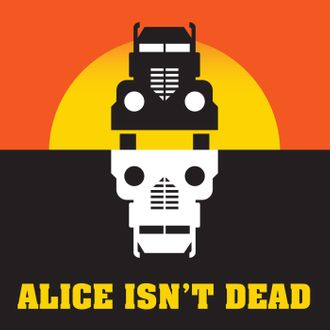
When Alice Isn’t Dead fires on all cylinders, it moves like music. “It is said they live in roadside places / in the bathrooms at gas stations / in commuter parking lots and out back-of-highway fast-food places,” narrates the main character, an anxiety-ridden truck driver searching for her missing wife. Her words are backed by the locomotion of strumming guitars, and as each sentence rolls into the next, mood and detail mix to imprint a feeling.
Alice Isn’t Dead, the fiction podcast written by Welcome to Night Vale co-creator Joseph Fink that concluded its three-season run in late August, is a love letter to odysseys, extended stretches on the road, and the longing you feel when you haven’t been home in a long time. No surprise given its Night Vale ties, this particular odyssey is also packed with horror elements, eldritch mythology, and the kind of stuff that would delight discerning creepypasta readers.
The plot revolves around the aforementioned truck driver, Keisha, affectingly voiced by Jasika Nicole, who you might remember from Fringe and who does voice work on Night Vale. A long-haul trucker for a banal-sounding but shadowy corporation called Bay & Creek, Keisha spends most daylight hours roaming through the lonely arteries of America, carrying out the will of supply chains and documenting her thoughts. (That self-documentation, spoken out loud, serves as the framing device that carries out the narrative.) Her employment at Bay & Creek is a recent development, as she was motivated into the job by the mystery at the center of story: Her wife, the titular Alice (voiced by Erica Livingston), was once a driver for the same company until she went missing on the job and is now presumed dead. Alice isn’t dead, of course, and the circumstances of her disappearances are supernaturally complicated. I won’t spoil the plot any further, other than to say that it involves two ancient groups locked in an eternal struggle, unexplainable evil tucked away in remote corners of this country, and the very guts of the American nation-state.
The plot is solidly entertaining, well-balanced between the strength of its YA-flavored mythological thrills and its many well-executed creepy ideas. (One standout example of the latter: Keisha’s very first encounter with the world’s staple ghoul, known as the Thistle Man, which takes place in a roadside diner and evokes the strong sensations of a nightmare.) But Alice Isn’t Dead’s more notable achievement lies in how it conjures mood, feeling, and a sense of place. At the heart of this production is a glowing affinity for journeys and the memories of them, particularly as they pertain to the great American road trip. The podcast’s milieu is a vast American empire of sprawling highways, greasy-spoon diners, and lonely motels. Of course, this expanse is littered with the unsettling, too: Those highways are long and dark, those diners lead into other dimensions, those motels are populated by forgotten ghosts.
That mixture of Americana and eeriness will please those who enjoyed Neil Gaiman’s American Gods, but the more precise analog may well be Kentucky Route Zero, the minimalist, avant-garde video game that built a gorgeous highway purgatory out of sharp lines, hard geometric shapes, and strange, ethereal figures. You can also see this in the various reveries about travel that Fink peppers into the script. There are so many of them that, at times, the plot can feel more like scaffolding for those observations — many of which are pretty delightful.
“There is an undeniable romance to travel, and there is a stranger, more specific romance to traveling constantly,” Keisha monologues at one point. “Rootlessness can be attractive, it really can be … When someone brings up Oklahoma City or Boise or Chicago or Portland, Oregon, or Portland, Maine, for each of those, you have a memory. Being able to think: Oh yeah, I’ve been there. You remember how it felt in a personal way. How Oklahoma City was surprising, because it was more hip than I expected. How Chicago in the summer feels happy in a way many other cities don’t. The exact smell of an antique store in a small town in Texas.” It’s heady, ponderous stuff. At times, it’s a little pretentious, but for the right kind of person, it’s absolutely delicious.
The podcast can be troublesome in some places. The story features a few sequences of physical conflict, which plays out in quick descriptions delivered by the narration. It’s serviceable, but tends to be pretty awkward. The narrative crescendos into explicit political allegory by the end, in which a fair bit of work is done to connect ideas of evil and personal responsibility to modern real-world concerns of collective organizing. These are really interesting ideas to explore within the context of Alice Isn’t Dead’s surreal and supernatural world, but in execution, they felt rushed and slightly heavy-handed. That heavy-handedness contrasts with the elegance of the script’s more universal elements — most notably, Keisha’s relationship with her wife. Over its three-season run, the podcast shines the brightest when it turns on its setpieces featuring the emotional lives of those two characters: their early courtship, an extended stay at a ghostly motel where they process a falling out, a lovely denouement that closes out the story.
Alice Isn’t Dead is, in many ways, the epitome of personal voice. Longtime listeners of Welcome to Night Vale will recognize Fink’s fingerprints all over the podcast, from its concerns to its turns of phrase and jokes. You can hear him working through ideas about personal travel, pivotal experiences, and politics, so it’s a real pleasure to take in the specificity of Fink’s voice, rough edges and all. In a few weeks, I’ll probably have a hard time recalling specific details about the podcast’s plot: names, places, events, who lives, who dies. But I will most definitely remember how I felt listening to it, and how it conjures feelings in a way that many other podcasts do not.


